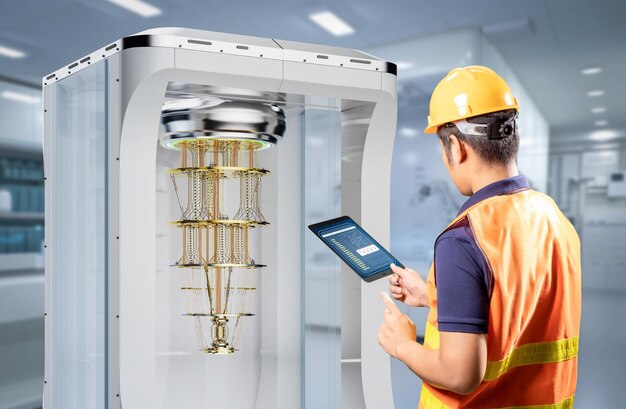Quantum Engineering

Quantum Engineering is an exciting and rapidly evolving field that holds the key to unlocking the immense potential of quantum technologies. It combines principles from quantum physics, engineering, and computer science to design and develop innovative solutions for a wide range of applications. From quantum computing and communication to advanced sensing and cryptography, this interdisciplinary field is shaping the future of technology and pushing the boundaries of what we thought was possible.
Unraveling the Quantum World

Quantum Engineering delves into the fascinating world of quantum mechanics, where particles can exist in multiple states simultaneously and exhibit phenomena like superposition and entanglement. These quantum effects, which defy classical intuition, offer unprecedented opportunities for information processing and communication.
Engineers and scientists in this field are exploring how to harness and control quantum systems to build powerful quantum computers, secure communication networks, and sensitive sensors. By manipulating and measuring quantum states, they aim to unlock computational power far beyond what is achievable with classical computers.
Quantum Computing Revolution
One of the most prominent applications of Quantum Engineering is quantum computing. Quantum computers, unlike their classical counterparts, rely on quantum bits or qubits to process information. These qubits can represent multiple values simultaneously, enabling quantum computers to solve complex problems exponentially faster.
Companies like IBM, Google, and Microsoft are at the forefront of developing quantum processors and algorithms. IBM, for instance, offers quantum computing services through its IBM Quantum Experience platform, allowing researchers and developers to access and experiment with quantum hardware remotely.
Quantum algorithms, such as Shor's algorithm for factoring large numbers and Grover's algorithm for searching unsorted databases, have the potential to revolutionize fields like cryptography, optimization, and drug discovery.
| Quantum Algorithm | Application |
|---|---|
| Shor's Algorithm | Factoring large numbers, breaking RSA encryption |
| Grover's Algorithm | Searching databases, optimization problems |
| Quantum Chemistry Algorithms | Simulating molecular structures, drug design |

Secure Quantum Communication
Quantum Engineering also plays a pivotal role in securing communication networks. Quantum key distribution (QKD) is a technique that leverages the principles of quantum mechanics to create unbreakable encryption keys. QKD systems use the quantum properties of photons to ensure that any attempt to intercept the communication would be immediately detectable.
Companies like ID Quantique and Toshiba are leading the way in developing commercial QKD systems. These systems have been deployed in various applications, including secure financial transactions, government communications, and critical infrastructure protection.
Quantum Sensing and Metrology
Quantum Engineering is revolutionizing the field of sensing and metrology. Quantum sensors, which utilize quantum phenomena like entanglement and quantum-enhanced measurements, offer unprecedented sensitivity and accuracy.
For instance, quantum magnetometers can detect incredibly weak magnetic fields, making them ideal for applications in geology, neuroscience, and even archaeological surveys. Quantum-enhanced gravitational wave detectors, such as those used in LIGO, have pushed the boundaries of precision measurement, enabling the detection of gravitational waves from cosmic events.
The Future of Quantum Engineering

The field of Quantum Engineering is still in its infancy, but its potential is immense. As researchers and engineers continue to make breakthroughs, we can expect to see quantum technologies integrated into various industries, transforming the way we compute, communicate, and sense our environment.
Quantum Engineering is poised to drive innovation in sectors like healthcare, finance, energy, and transportation. From developing new drugs and materials to optimizing supply chains and securing critical infrastructure, the impact of quantum technologies will be far-reaching.
Furthermore, the development of quantum-inspired classical algorithms and the exploration of hybrid quantum-classical systems are opening up new avenues for practical applications. These approaches aim to leverage the power of quantum computing while maintaining compatibility with existing classical infrastructure.
As we venture further into the quantum realm, it is essential to address the challenges of scalability, error correction, and quantum hardware development. Collaborative efforts between researchers, engineers, and industry experts will be crucial in overcoming these obstacles and realizing the full potential of Quantum Engineering.
Quantum Education and Outreach
Educating the next generation of quantum engineers and scientists is crucial for the continued growth of the field. Universities and research institutions are offering dedicated programs in Quantum Engineering, providing students with the necessary skills and knowledge to contribute to this rapidly advancing domain.
Outreach programs and initiatives are also playing a vital role in raising awareness about quantum technologies and their potential impact. By engaging with the public, researchers can dispel misconceptions and foster a broader understanding of quantum mechanics and its practical applications.
The Quantum Advantage
Quantum Engineering offers a unique advantage over classical approaches by harnessing the power of quantum phenomena. The ability to process information in parallel, secure communication channels, and detect subtle changes in our environment opens up new possibilities for innovation and problem-solving.
As we navigate the challenges and opportunities of the quantum era, Quantum Engineering will continue to push the boundaries of what we thought was achievable. From quantum-inspired artificial intelligence to quantum-enhanced materials, the applications are limitless. Embracing this transformative technology will be key to staying at the forefront of innovation and shaping the future of our world.
What is the difference between quantum computing and classical computing?
+Quantum computing utilizes quantum bits (qubits) to process information, allowing for exponential parallelism. Classical computing, on the other hand, relies on bits that can only represent either a 0 or a 1. This fundamental difference in information processing gives quantum computers the potential to solve certain complex problems much faster than classical computers.
How does quantum entanglement play a role in Quantum Engineering?
+Quantum entanglement is a phenomenon where the quantum states of two or more particles become correlated, regardless of the distance between them. In Quantum Engineering, entanglement is crucial for tasks like quantum teleportation, where quantum information can be transmitted instantly between entangled particles. It also forms the basis for quantum cryptography, ensuring secure communication.
What are the challenges in developing practical quantum technologies?
+Developing practical quantum technologies faces several challenges, including the need for extremely low temperatures and controlled environments to maintain quantum states. Additionally, quantum systems are highly sensitive to external disturbances, making error correction and fault tolerance critical aspects of quantum hardware development.



